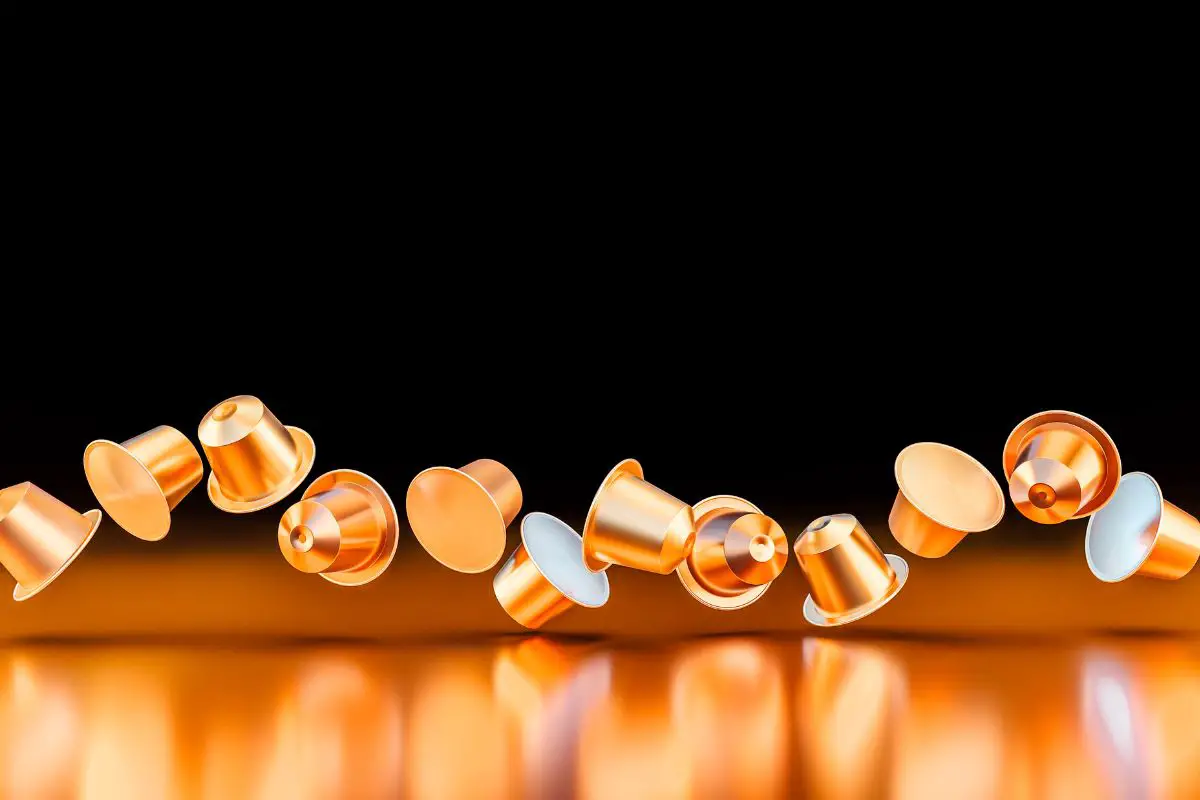In the world of coffee, a single drop can awaken not only the senses but also the mind. Nespresso, renowned for its convenience and quality, offers a wide range of coffee capsules that cater to diverse preferences.

However, for those seeking to control their caffeine intake, understanding the caffeine content in Nespresso’s coffee capsules becomes crucial. This article aims to explore the Nespresso caffeine content in detail, providing an analytical and informative overview for the audience concerned with their safety.
By delving into factors that affect caffeine levels in coffee, comparing Nespresso’s caffeine content with other coffee brands, and offering insights into decaffeinated options, readers will gain a comprehensive understanding of the caffeine landscape within Nespresso.
Additionally, practical tips for managing caffeine intake will be provided, empowering readers to make informed decisions about their coffee consumption.
Let us embark on this journey of exploration and knowledge, navigating the intricate world of Nespresso caffeine content together.
Key Takeaways
- Nespresso offers a wide range of coffee capsules with different preferences.
- Nespresso capsules contain high-quality Arabica and Robusta beans from different regions.
- Nespresso coffee capsules contain approximately 55-65 mg of caffeine per serving on average.
- Decaffeinated Nespresso coffee typically contains less than 0.1% caffeine content.
Factors that Affect Caffeine Levels in Coffee
The caffeine levels in coffee are influenced by various factors. One of the most significant factors is the type of coffee bean used. Coffea arabica, the most common coffee bean, generally contains less caffeine compared to Coffea canephora (Robusta).
The brewing method also plays a crucial role in determining caffeine content. The longer the contact time between water and coffee grounds, the higher the caffeine concentration. Consequently, espresso typically has a higher caffeine content than drip-brewed coffee.
Another important factor is the coffee-to-water ratio. Using a larger amount of coffee grounds per cup of water will result in a higher caffeine content.
Additionally, the roast level of the coffee beans affects caffeine levels. Contrary to popular belief, darker roasts actually have slightly less caffeine content compared to lighter roasts.
Lastly, brewing temperature can influence caffeine extraction. Higher water temperature leads to greater caffeine extraction.
Understanding these factors is essential in comprehending Nespresso’s coffee capsules. While Nespresso offers a wide range of coffee capsules, their caffeine content is dependent on the factors mentioned above. By considering these elements, individuals can make informed decisions about the caffeine content in their Nespresso coffee.
Understanding Nespresso’s Coffee Capsules
One important aspect to consider when evaluating Nespresso’s coffee capsules is understanding the composition and characteristics of the coffee blend they contain. Nespresso offers a wide range of coffee capsules, each with its unique flavor profile and intensity level. The composition of their coffee blends is carefully crafted, using a combination of high-quality Arabica and Robusta beans sourced from different regions worldwide. These beans are selected based on their flavor profiles, acidity levels, and aroma characteristics, ensuring a consistent and enjoyable coffee experience.
To evoke emotion in the audience, it is important to highlight the following sub-lists:
- The first sub-list focuses on the meticulous sourcing process, emphasizing the sustainable and ethical practices employed by Nespresso to support farmers and protect the environment.
- The second sub-list highlights the precision in roasting and grinding the coffee beans, ensuring optimal flavor extraction and a rich aromatic profile.
- The third sub-list emphasizes the convenience and versatility of Nespresso capsules, allowing users to effortlessly prepare a variety of coffee beverages at home, reducing the need for expensive coffee equipment or barista skills.
Understanding these aspects of Nespresso’s coffee capsules not only ensures a delightful coffee experience but also provides a sense of satisfaction in supporting a brand that values sustainability and quality.
Transitioning into the subsequent section about ‘caffeine comparison with other coffee brands,’ it is vital to consider the caffeine content in Nespresso capsules and how it compares to other popular coffee brands.
Caffeine Comparison with Other Coffee Brands
In comparing the caffeine levels found in Nespresso coffee capsules to those of other popular coffee brands, it is interesting to note the variations that exist among different products.
Nespresso offers a wide range of coffee capsules, each with its own unique flavor profile and caffeine content. On average, a Nespresso coffee capsule contains approximately 55-65 mg of caffeine per serving. This falls within the range of caffeine content found in other coffee brands, such as Starbucks and Dunkin’ Donuts. However, it is worth mentioning that some Nespresso varieties may have slightly higher or lower caffeine levels, depending on the specific blend and roast.
It is important to note that caffeine content can vary based on factors such as brewing method, coffee bean type, and serving size. Additionally, individual tolerance to caffeine can vary greatly, so it is advisable to consume coffee in moderation and be aware of personal caffeine sensitivity.
For those seeking a lower caffeine option, Nespresso also offers decaffeinated coffee capsules, which undergo a special process to remove most of the caffeine while retaining the flavor. Transitioning to the next section about decaffeinated options, it is important to understand the differences in caffeine content between regular and decaffeinated coffee capsules.
Decaffeinated Options
This paragraph will discuss the process by which Nespresso removes caffeine from their coffee, as well as the caffeine content in their decaffeinated options.
Nespresso utilizes a method called the Swiss Water Process, which involves using water and activated carbon to remove caffeine while preserving the flavor of the coffee.
The caffeine content in decaffeinated Nespresso varies depending on the blend, but it generally contains 0.1% or less caffeine, making it suitable for those who are sensitive to caffeine or prefer to limit their intake.
How Nespresso Removes Caffeine
Nespresso employs a meticulous process that involves using a carbon dioxide extraction method to eliminate caffeine from coffee beans, akin to delicately chiseling away impurities from a precious gem. This method ensures that the decaffeinated coffee retains its rich flavor profile while significantly reducing the caffeine content.
The process can be summarized in four steps:
- Pre-soaking: The coffee beans are soaked in water to remove any soluble compounds, including caffeine.
- Pressurized carbon dioxide: The beans are then placed in a stainless steel container and exposed to pressurized carbon dioxide, which acts as a solvent to extract the caffeine.
- Filtration: The caffeine-rich carbon dioxide is filtered off, leaving behind caffeine-free coffee beans.
- Drying and packaging: The decaffeinated coffee beans are dried and packaged, ready for use.
This meticulous process ensures that Nespresso’s decaffeinated options provide a safe and enjoyable coffee experience, with reduced caffeine content. Moving into the subsequent section on ‘caffeine content in decaffeinated Nespresso,’ it is worth exploring how Nespresso’s extraction method affects the final caffeine levels in their decaffeinated coffee.
Caffeine Content in Decaffeinated Nespresso

The analysis of decaffeinated Nespresso coffee focuses on the level of caffeine present after the extraction process. Decaffeinated coffee is created by removing most of the caffeine from the coffee beans. Nespresso uses a Swiss Water Process, which involves soaking the beans in water to extract the caffeine. The water is then passed through a charcoal filter to remove the caffeine molecules. The process is repeated several times until the desired level of caffeine is reached. Nespresso decaffeinated coffee typically contains less than 0.1% caffeine content, which is significantly lower than regular coffee. This low caffeine content makes it a suitable choice for individuals who are sensitive to caffeine or who want to limit their caffeine intake. Transitioning to the subsequent section about ‘tips for controlling your caffeine intake’, it is important to be aware of the caffeine content in different beverages and choose decaffeinated options when necessary.
Tips for Controlling Your Caffeine Intake
To effectively manage your caffeine consumption, it is essential to implement strategies that allow for greater control over the amount consumed. For individuals who are concerned about their caffeine intake, there are several tips that can help in controlling it.
Firstly, it is important to be aware of the caffeine content in the beverages you consume. Reading labels and understanding the caffeine content of different drinks can provide valuable information for making informed choices. Additionally, opting for decaffeinated versions of your favorite beverages, such as decaffeinated Nespresso, can significantly reduce your caffeine intake while still enjoying the taste.
Another useful tip is to limit the number of caffeinated beverages you consume per day. Setting a maximum limit and sticking to it can help regulate your caffeine intake. It may also be helpful to gradually reduce your caffeine consumption over time to avoid withdrawal symptoms.
Furthermore, monitoring the time of day you consume caffeine can be beneficial. Avoiding caffeine intake close to bedtime can help promote better sleep quality and prevent insomnia.
By being aware of the caffeine content in beverages, limiting the number of caffeinated drinks consumed, and monitoring the timing of consumption, individuals can effectively manage their caffeine intake. These strategies can provide greater control and help maintain a safe and balanced caffeine consumption.
Frequently Asked Questions
Are Nespresso coffee capsules more or less caffeinated than other types of coffee pods?
Nespresso coffee capsules do not necessarily have a higher or lower caffeine content than other types of coffee pods. The caffeine content can vary depending on the specific blend and roast level used in the capsules.
What factors can affect the caffeine levels in Nespresso coffee?
Several factors can impact the caffeine levels in Nespresso coffee. These include the type of coffee bean used, the roasting process, the brewing method, the water temperature, and the serving size. It is important to consider these factors for those concerned about caffeine intake.
How does the caffeine content in Nespresso coffee compare to traditional brewed coffee?
The caffeine content in Nespresso coffee is generally lower compared to traditional brewed coffee. This is due to the different brewing methods and the use of pre-measured capsules, which may result in a lower extraction of caffeine.
Are there any decaffeinated options available for Nespresso coffee capsules?
Decaffeinated options are available for Nespresso coffee capsules, catering to individuals who desire safety and want to avoid the stimulating effects of caffeine. These options provide a thorough and analytical alternative for caffeine-sensitive individuals.
What tips can you provide for individuals who want to control their caffeine intake while using Nespresso machines?
To control caffeine intake while using Nespresso machines, individuals can opt for decaffeinated coffee capsules, monitor their consumption, and limit the number of cups per day. It is important to consult a healthcare professional for personalized advice.
Conclusion
In conclusion, the caffeine content in Nespresso coffee capsules is influenced by various factors such as the type of coffee bean, brewing method, and serving size.
While some may argue that Nespresso offers a convenient and efficient way to enjoy a cup of coffee, it is ironic that the caffeine content in their capsules may not be as high as one might expect.
However, for those looking to control their caffeine intake, Nespresso does offer decaffeinated options.
Ultimately, it is important for coffee enthusiasts to be aware of their caffeine consumption and make informed choices accordingly.
Also read:
How To Make Latte With Nespresso